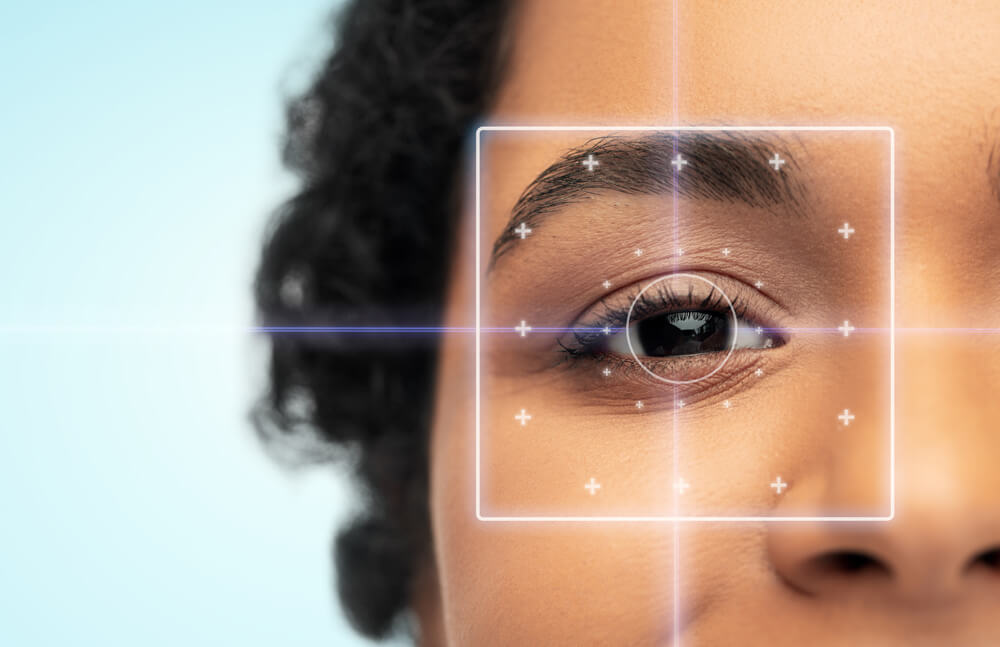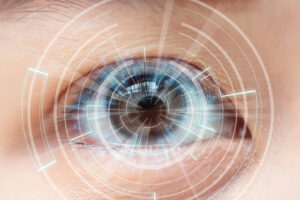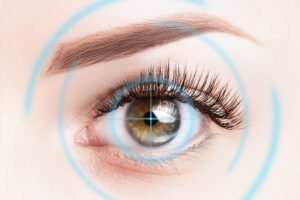
Nyctalopia, commonly known as night blindness, can significantly impact one’s ability to see in low light conditions, leading to challenges navigating in the dark. The symptoms of night blindness, such as difficulty driving at night or seeing in dimly lit environments, can be concerning for individuals experiencing this condition.
In this comprehensive guide, we will delve into the causes, symptoms, and treatments for nyctalopia, shedding light on how Diamond Vision‘s advanced cataract surgery and expertise in laser procedures can offer clarity and improved vision, especially in low-light situations.
Understanding Nyctalopia: An Overview
Defining Night Blindness
Nyctalopia, or night blindness, refers to a condition where an individual’s vision is compromised in dim light or darkness, unlike in complete blindness where vision is lost in all conditions. People with night blindness experience difficulty adjusting from well-lit areas to darker ones, which can be particularly evident while driving after sunset. This condition does not mean complete blindness at night, but rather a significant reduction in visual capability.
It’s important to note that night blindness is often symptomatic of underlying eye conditions. Identifying the root causes, which vary widely from genetic factors to nutritional deficiencies, is crucial to managing and treating nyctalopia effectively. For those questioning, “Why can’t I see at night?”, a thorough examination by a vision specialist is essential to diagnose and address night blindness symptoms and causes.
The Causes of Nyctalopia
The underlying causes of nyctalopia are varied and can range from congenital conditions to acquired eye health issues. One common cause is retinitis pigmentosa, a genetic disorder that affects the retina’s ability to respond to light. Other causes include cataracts, which cloud the eye’s lens and can lead to nighttime blindness by reducing the amount of light that enters the eye. Nutritional deficiencies, particularly a lack of vitamin A, can also contribute to night blindness.
Furthermore, certain medications and LASIK surgery complications might result in temporary or permanent difficulties with night vision. Lastly, progressive eye conditions like glaucoma and diabetic retinopathy can damage the optic nerve or retina, leading to nyctalopia. Understanding these causes is critical for early detection and treatment, which can improve night vision and overall quality of life.

Night Blindness Symptoms: Recognizing the Signs
Typical Symptoms of Nyctalopia
People with night blindness often report a range of symptoms that are most noticeable in poor lighting conditions. The primary symptom is difficulty seeing or driving in the dark, which can lead to increased risk of accidents or falls. Many also experience longer adjustment periods when moving from brightly lit environments to darker ones, such as entering a dimly lit restaurant or theater. Another common sign is excessive squinting or the need for brighter light when reading or performing tasks at night.
Additionally, some may notice a decrease in the clarity of vision during nighttime, resulting in blurred or hazy vision. These night blindness symptoms are often more pronounced in situations with contrasting light levels, such as nighttime driving with oncoming headlights. If any of these signs are present, it’s advisable to seek an evaluation from a vision care specialist.
When to Seek Medical Consultation
If you’re experiencing difficulty with your night vision, it’s important to consider seeking medical advice. Early signs that warrant a consultation include struggling to see in low light areas, difficulty adjusting to darkness after being in a well-lit space, or if you find yourself hesitating to drive at night due to vision concerns.
Additionally, if you notice that these symptoms are progressively worsening, it’s crucial to book an appointment with an eye care professional without delay. Early detection of the underlying causes of night blindness can be instrumental in preventing further vision deterioration. A comprehensive eye examination can help diagnose potential conditions such as cataracts or retinal issues that may be contributing to nyctalopia.
Remember, timely intervention can make a significant difference in managing symptoms and maintaining your quality of life.
Nyctalopia Diagnosis: Accurate Assessment for Effective Treatment
Diagnostic Procedures
To accurately diagnose nyctalopia, eye care professionals employ a variety of tests. These tests help determine how well a person can see in low-light conditions and what might be causing their night blindness. A routine eye exam is usually the first step, which includes reading an eye chart to measure visual acuity.
The next phase might involve a retinal examination to check for diseases that affect the retina, the part of your eye that’s crucial for night vision. Additionally, an electroretinogram (ERG) test may be conducted to assess the electrical responses of the rods and cones in the retina, which are responsible for translating light into vision.
Other tests such as visual field testing can help detect blind spots in vision, which may be more pronounced in dim light. These diagnostic procedures are essential in crafting a tailored treatment plan.
Understanding Your Diagnosis
After completing the necessary diagnostic tests, your eye care specialist will explain the results and what they mean for your condition. If you have been diagnosed with nyctalopia, the doctor will discuss the specific factors contributing to your night blindness. This could involve a detailed conversation about your medical history, genetic factors, or lifestyle choices that may be affecting your vision.
Understanding the diagnosis is key to your treatment plan. For instance, if cataracts are the cause, cataract surgery might be recommended to restore your night vision. If a vitamin deficiency is the culprit, dietary changes and supplements may be advised.
Additionally, it’s important to consider the impact of the diagnosis on your daily life and discuss any concerns with your doctor. They can provide guidance on how to adapt and may recommend resources or support services to assist you in managing your night blindness effectively.
Treatment Options for Nighttime Blindness: Restoring Vision
Non-Surgical Treatments
For those facing nyctalopia, non-surgical treatments can be an effective first step. Depending on the cause of night blindness, options may include corrective eyeglasses or contact lenses, especially if refractive errors are contributing to poor night vision. For cases linked to nutritional deficiencies, dietary modifications and vitamin supplements, particularly vitamin A, may be recommended.
When retinal diseases are involved, medications to slow progression may be prescribed. In addition, assistive devices such as night vision scopes can be beneficial for some individuals. It’s also important to minimize risks associated with night blindness by ensuring environments are well-lit and using caution when navigating in the dark.
Your eye care provider will work with you to determine the best non-surgical treatment options based on the specifics of your diagnosis and lifestyle needs.
Surgical Treatments: LASIK and Beyond
When non-surgical methods are insufficient, surgical options may be considered to combat night blindness. Cataract surgery, one of the most common and effective procedures, replaces the clouded lens with a clear artificial one, often resulting in significantly improved night vision. For some patients, LASIK surgery can also be a solution, particularly if refractive errors are causing difficulties with night vision.
Advanced techniques in LASIK have reduced the risks of night vision complications that were more common in earlier procedures. Retinal detachment or damage, if found to be the cause of nyctalopia, may be addressed through various types of retinal surgery. Diamond Vision offers expertise in these advanced surgical procedures, providing patients with the latest technology and techniques aimed at restoring vision.
It’s essential to discuss all potential risks and benefits of surgical treatments with your eye care specialist to make an informed decision.

Cataract Surgery at Diamond Vision: A Trustworthy Solution
Understanding Laser Cataract Surgery
Laser cataract surgery is a state-of-the-art procedure that uses advanced laser technology to remove cataracts with precision and restore vision, often helping patients overcome nyctalopia. At Diamond Vision, we utilize laser technology to create an incision in the eye’s surface, gently break up the cloudy lens, and facilitate its removal.
This approach allows for a high degree of accuracy and can result in a more comfortable recovery compared to traditional methods. During the surgery, an artificial intraocular lens (IOL) is implanted to replace the natural lens, with options that can correct other vision problems as well. It’s a quick outpatient procedure with a high success rate in improving not just night vision but overall eyesight.
Understanding the specifics of laser cataract surgery can help alleviate concerns and ensure patients feel confident in their decision to choose Diamond Vision for their eye care needs.
The Multifocal Lenses Advantage
Multifocal lenses are an innovative option available for patients undergoing cataract surgery at Diamond Vision. These lenses are designed to provide clear vision at multiple distances, from near to far, and can greatly reduce or even eliminate the need for glasses after surgery. For those with nyctalopia, multifocal lenses can offer a substantial improvement in night vision by improving the eye’s ability to focus light properly.
This is particularly beneficial when dealing with the high contrast environments that are challenging for individuals with night blindness. The advantage of multifocal lenses lies in their ability to provide a full range of vision, which can significantly enhance the overall quality of life. Patients should discuss their lifestyle and vision goals with their surgeon to determine if multifocal lenses are the best option for their specific needs.
Candidacy for Laser Cataract Surgery
Determining if you’re a candidate for laser cataract surgery is a critical step taken at Diamond Vision. Ideal candidates are those experiencing vision impairment due to cataracts that interfere with daily activities, including driving, reading, or recognizing faces. Specifically for night blindness, patients who struggle with seeing in low light conditions may see significant improvement post-surgery.
However, candidacy isn’t solely based on symptoms; a comprehensive eye exam is necessary to assess the overall health of your eyes. Factors such as corneal thickness, the density of the cataract, and the eye’s internal structure are all considered. Additionally, patients should have a stable eye prescription and no significant eye diseases beyond cataracts to qualify for the procedure.
Our team at Diamond Vision provides thorough evaluations to ensure that laser cataract surgery is a safe and effective option for each patient.
The Diamond Vision Difference
Diamond Vision sets itself apart by offering personalized, precision-based cataract surgery tailored to each patient’s unique vision needs. Our team of experienced surgeons is equipped with the latest laser technology, ensuring the highest standards of safety and effectiveness. We understand that each case of nyctalopia and cataract is different and require a customized approach to treatment.
Beyond the advanced surgical techniques, Diamond Vision provides a comprehensive care experience. From the initial consultation to post-operative care, our patients receive attentive support and guidance. We also prioritize patient education, ensuring that individuals are well-informed about their condition and the available treatment options.
This commitment to excellence in patient care and surgical outcomes is at the heart of the Diamond Vision difference, making us a trusted choice for those seeking to restore their night vision and improve their overall quality of life.
Aftercare and Recovery: Ensuring Successful Outcomes
Post-Operative Care for Cataract Surgery
Successful cataract surgery at Diamond Vision is followed by an equally important post-operative care plan to ensure the best possible recovery and outcomes. After surgery, patients are given detailed instructions about how to care for their eyes, which includes using prescribed eye drops to prevent infection and reduce inflammation. It’s crucial to avoid rubbing or pressing on your eye and to wear protective eyewear as advised, especially at night to prevent accidental injury while sleeping.
Patients are scheduled for follow-up appointments to monitor the healing process and to assess how well their night vision has improved. During recovery, any discomfort, light sensitivity, or mild redness is typically normal and temporary. However, prompt attention to any signs of complications, such as severe pain or vision changes, is vital. Adhering to these post-operative care instructions is key to achieving the best vision restoration after cataract surgery.
Long-Term Vision Improvement and Maintenance
After cataract surgery, most patients experience a significant improvement in their vision, including reduced night blindness symptoms. To maintain these benefits long-term, it’s essential to follow through with regular eye examinations as part of your aftercare routine. These check-ups allow for the early detection and treatment of potential issues that could affect your vision in the future.
Patients are also advised to protect their eyes from excessive sunlight exposure by wearing UV-protective sunglasses, which can help preserve the health of the intraocular lens and the retina. Maintaining a healthy lifestyle, including a balanced diet rich in eye-friendly nutrients like vitamins C and E, omega-3 fatty acids, and zinc, can support overall eye health. For those with specific concerns about night blindness, specialized low vision aids and adaptive devices can further enhance visual capabilities in low-light conditions.
Diamond Vision is committed to supporting our patients in their journey towards sustained vision improvement and eye health. Call us and find out why we are the best at what we do. Let us be your guiding light!
Contact Us
If you have more questions about LASIK procedures, get in touch with us.
Related Blogs

Timing is Everything: When to Consider LASIK After Nursing for Optimal Results
Timing is everything when considering LASIK eye surgery after nursing, and understanding the optimal period for this procedure is vital for both mother and baby.

Cataract Surgery: Restoring Clarity and Confidence
Cataract surgery is a transformative procedure that offers a new lease on clear vision and renewed confidence. As cataracts cloud the eye’s lens, causing blurred

Intralase LASIK Explained: What to Expect Before, During, and After the Procedure
Intralase LASIK is a cutting-edge procedure that offers a safe, effective, and precise way to enhance vision compared to traditional LASIK methods. Understanding what to
